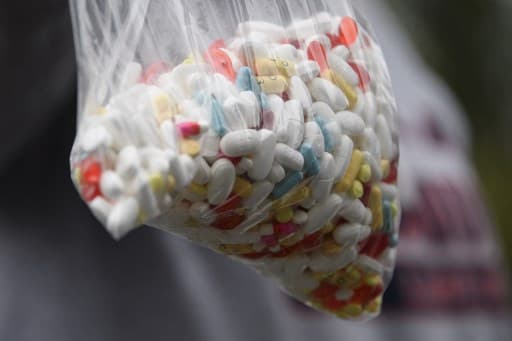
Patrick T. FALLON / AFP
(AFP) — Prosecutors from several US states on Wednesday unveiled a sweeping proposed settlement under which four pharmaceutical companies accused of fueling the country’s opioid epidemic would pay up to $26 billion to resolve thousands of claims in federal and state courts.
Under the proposed agreement, three drug distributors — McKesson, Cardinal Health and Amerisource Bergen — along with drugmaker Johnson & Johnson, would pay to resolve some 4,000 claims as well as finance prevention and treatment programs, said New York Attorney General Letitia James.
The proposed settlement is the largest unveiled in the multi-year legal effort to hold the industry accountable for the opioids crisis, which has caused more than 500,000 deaths in the United States in the last 20 years.
“The numerous companies that manufactured and distributed opioids across the nation did so without regard to life or even the national crisis they were helping to fuel,” James said in a statement.
“Today, we are holding these companies accountable and infusing tens of billions of dollars into communities across the nation.”
James told reporters that the settlement covers civil cases, but did declined to comment on whether criminal charges were still possible.
– ‘People are dying’ –
At least two states, Washington and West Virginia, criticized the agreement and vowed to continue litigation.
Washington state Attorney General Bob Ferguson said the proposed $527.5 million payoff to his state over 18 years was “not a transformative amount of money, and is not sufficient to address the opioid’s crisis’ devastation.”
West Virginia Attorney General Patrick Morrisey, who settled previously with the three distributors but still has a case open against J&J, said the agreement “shortchanges” smaller states by apportioning funds on the basis of population rather than “the intensity of the opioid crisis.”
Prosecutors supporting the agreement said they expect most states would welcome a chance for immediate funds.
“We want to get these monies in our communities as quickly as possible, and to the maximum amount possible because people are dying, and we want to save lives,” said North Carolina Attorney General Josh Stein.
He said he expects more than 40 states will support the settlement.
Besides New York and North Carolina, the states of Connecticut, Delaware, Louisiana, Pennsylvania and Tennessee have already signed the deal.
– National clearinghouse –
The settlement does not address legal cases against Teva and Allergan, nor does it address the role of drugstore chains such as Walgreens and CVS that have also been sued.
Under the agreement, J&J agreed to pay up to $5 billion over nine years and to stop selling opioids nationwide, James said.
The three distributors will pay up to $21 billion over 18 years, and agreed to set up a centralized clearinghouse to help state officials track drug shipments and better guard against suspicious orders.
The exact amount will be determined by overall participation of state and local governments, according to James’ statement.
The three distributors described a process where first the states, and then localities, would have chance to support the agreement.
At each stage, each of the three companies will “independently determine” whether there is enough support to proceed.
“While the companies strongly dispute the allegations made in these lawsuits, they believe the proposed settlement agreement and settlement process it establishes… are important steps toward achieving broad resolution of governmental opioid claims and delivering meaningful relief to communities across the United States,” the companies said.
McKesson could pay up to $7.9 billion, while the other two companies could be each responsible for up to $6.4 billion.
J&J’s general counsel Michael Ullmann said the proposed settlement “will directly support state and local efforts to make meaningful progress in addressing the opioid crisis in the United States.”
Shares of all four companies gained, as investors greeted the chance of removing uncertainty surrounding the price of liability.
Shares of J&J rose 0.6 percent to $169.49, McKesson gained 1.6 percent to $197.54, AmerisourceBergern climbed 1.5 percent to $118.22 and Cardinal health advanced 1.6 percent to $58.60.
© Agence France-Presse
